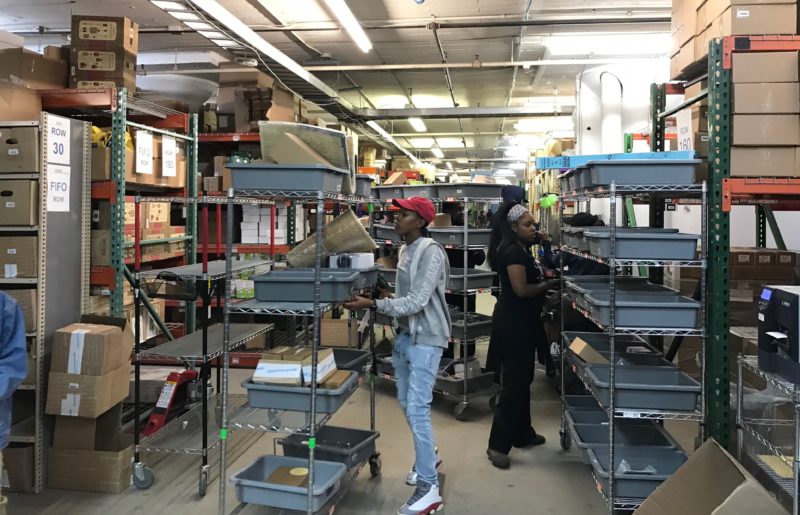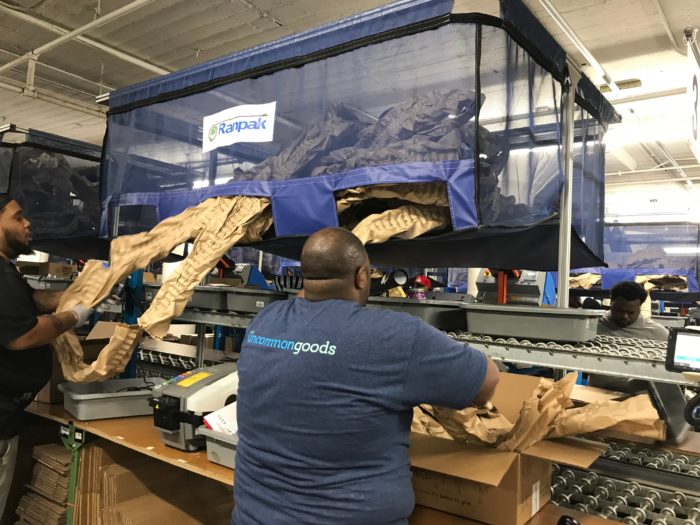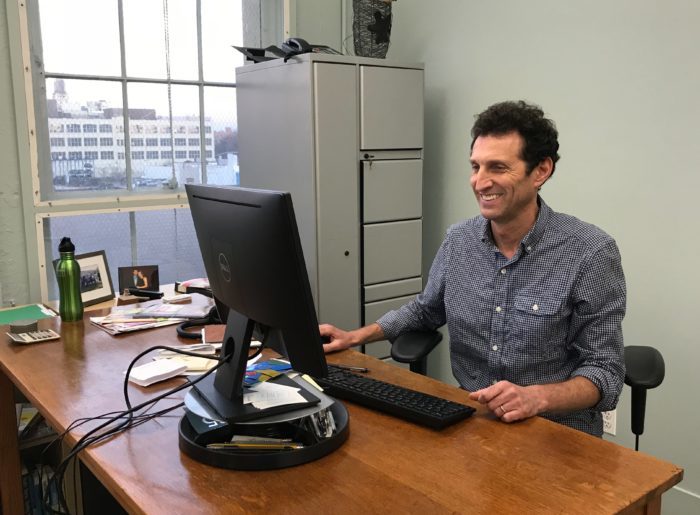Where Seasonal Work Can Be More than Just a Holiday Gig
Brooklyn e-commerce retailer UncommonGoods aims to guide its hundreds of temp workers toward year-round careers
Workers in the warehouse area at UncommonGoods in Sunset Park (Photos by Kadia Goba)
Every holiday season, the number of workers at Brooklyn-based online retailer UncommonGoods grows by the hundreds, swelling the company from its payroll of 200 employees to 1,000 or more. Jamel Venn-Simmons, 37, of East New York, is happy to be one of them. “They’re a really good company,” says Venn-Simmons, who tracks down merchandise for outbound packages. “On the weekends they give us lunch and they always give us hours, which really helps during the holiday season.” She’s not the only one in the family to benefit–her sister works there too.
What’s unusual about the seasonal work at UncommonGoods, however, is that the job opportunity doesn’t necessarily go away the day after Christmas. UncommonGoods, which is based in the Brooklyn Army Terminal in Sunset Park, makes a concerted effort to help the seasonal employees find their next jobs. Last year the company partnered with the city agency Workforce1 and the nonprofit group Brooklyn Workforce Innovations to create a job fair for departing seasonal employees. Forty staff members landed job interviews. This year, the company is planning a workshop on resumé building.
Those are some of the ways in which UncommonGoods founder and CEO Dave Bolotsky aims to foster full-time careers for the company’s seasonal workers, many of whom come from disadvantaged situations. “There are some people whose only job, each year, is working with us for the holidays–I don’t feel good about that,” he told The Bridge.

Warehouse packers using paper-based packing material that replaced inflatable plastic bubbles
While sustainability in business is usually associated with environmental impact, Bolotsky’s company energetically applies the concept to the community and to the careers of its workers. “Do I care about the tree? Sure I care about the tree, but I care a lot more about my kids, or myself, or paying the rent,” says Bolotsky.
For some of the seasonal workers, the job is a gateway they might not otherwise find. The company works with economic-development groups including the Bedford Stuyvesant Restoration Corp. and Nontraditional Employment for Women (NEW) to find candidates, some from disadvantaged backgrounds, as well as posting the jobs on sites like Indeed.com. That’s where Brooklynite Georgia Husbands, 19, found her job in the UncommonGoods operations department. “I’ve learned how to build and pack boxes properly,” she said. “I’m responsible for putting labels on boxes before they ship.”
Depending on their role and responsibility, seasonal employees start with a competitive wage of $14.50 to $20 an hour, far beyond New York City’s current minimum wage of $11 an hour (it goes up to $13 next year for companies with more than ten employees). And while much of the temporary help is needed in the operations department, the company also hires new and returning staff to handle customer service, human resources and accounting. Those jobs can pay an annual equivalent of $50,000 and up.

Company CEO Dave Bolotsky, who puts a major emphasis on social and environmental sustainability
The company’s sense of purpose goes back to a time even before its founding, when Bolotsky was a Goldman Sachs retail analyst looking to build a business around community engagement. Following a visit to the annual Smithsonian Craft Show, however, he pivoted to the idea of an e-commerce site focused on unusual gifts and launched it in 1999 from his Lower East Side apartment. The bursting of the dotcom bubble brought a near-death experience for the company, but Bolotsky and his co-founder Thomas Epting persevered.
Since 2007, the company has maintained its standing as a B Corp., which means that it has measurably proven its commitment to social and environmental sustainability. (UncommonGoods pays attention to the latter aspect as well, for example by switching from inflatable plastic as a packing material to an eco-friendly, paper-based material.) Part of the company’s status as a B Corp. comes from its efforts not only to helping workers facing barriers to a career, but training them for advancement and financial stability.
On the 5th floor at the Army Terminal, the conference-room doors bear signs of Brooklyn neighborhoods. Recently the room labeled Brighton Beach hosted a special guest: a financial empowerment counselor who was brought in to help workers minimize their debt, improve their credit, and save for the future. “We try to support our team as much as possible,” says Sean Cullen, the company’s sustainability and community partner. “People want to work for a company that does good.”

At UncommonGoods’ offices, rows of shelving display its unusual offerings so employees can get to know them better
Bolotsky has even bigger ideas for job creation. The CEO envisions a large-scale, counter-seasonal employment movement that he hopes New York City lawmakers would support. The program would shuffle qualified staffers between three non-competitive entities that would employ workers during their respective seasons. The company is in discussions with the New York Aquarium in Coney Island in the hope of creating a network of transitional employment throughout the borough.
The aquarium would partner with UncommonGoods to employ their winter staff during the summer, a practice that Bolotsky has informally carried out for several years. “My feeling is if you have two or three seasonal jobs you become more financially independent and require less governmental support,” he said. “More than that, the odds are it will lead to year-round work.”
Sometimes the transition to year-round work happens at UncommonGoods. Brooklyn native Hurley Jacques, 32, discovered UncommonGoods when he received a gift via the company. A few months later, during the holiday season of 2016, he was working in the shipping department. This year, Jacques works full-time as a facilities manager for the company. “It’s a great place to work, people love it here,” he said. “Dave and Tom created a wonderful work environment for their employees.”













